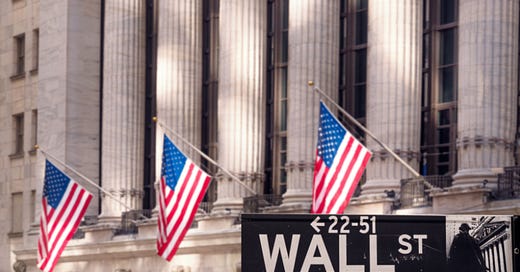US stocks hit records Tuesday as markets recovered from President-elect Trump's surprise Monday tariff plans, including a 10% duty on Chinese imports and 25% on goods from Mexico and Canada, while traders digested the release of the Fed meeting minutes which showed officials appeared divided over how much further they may need to cut interest rates.
In the report, the central bank stated it anticipates future interest rate cuts but emphasised that they will occur "gradually."
Bitcoin traded around US$92,000, down for a second day after nearing US$100,000 on Friday.
Still, it has remained at 35% since the US election, driven by optimism over crypto-friendly policies under Trump.
At the New York close, preliminary data showed the Dow Jones Industrial Average rose 123.74 points, or 0.28%, to 44,860.31.
The Standard & Poor's 500, a key global benchmark, rose 34.26 points (0.57%) to 6,021.63, while the Nasdaq Composite added 119.46 points (0.63%) to reach 19,174.30.
The so-called "Magnificent Seven" delivered mixed performances: Nvidia edged up 0.5%, Tesla ended flat, Microsoft climbed 2.1%, Apple added 0.3%, Alphabet (formerly Google) gained 0.9%, Amazon surged 2.7%, and Meta (formerly Facebook) advanced 1.4%.
Some major stocks declined, including General Motors and Ford, both impacted by Trump's tariff threats targeting Mexican imports.
News sources reported that economists are cautioning that Trump’s broad-based tariff proposals could raise the cost of everyday goods in the US and hinder global growth.
Meanwhile, Mexican President Claudia Sheinbaum Pardo suggested that the US tariffs could prompt retaliation, while Canada's Prime Minister Justin Trudeau emphasised the need for cooperation.
In bonds, crypto and commodities
The 10-year Treasury yield, which influences mortgage rates and other key loans in the US government bond market, settled at 4.30%.
The policy-sensitive two-year yield, which closely tracks Federal Reserve interest rate adjustment expectations, closed at 4.25%.
In the crypto universe, Bitcoin, the largest by market cap, weakened further since Donald Trump’s US election victory, as a failed run at US$100,000 cooled speculative interest sparked by the president-elect’s embrace of crypto, signalling that the 'honeymoon' period for the digital currency may be over.
It traded within an intraday range of US$92,817 to US$94,978 before settling at US$91,977.
Viewing the pullback, the support may initially be found around US$86,300, with additional buying interest likely near US$73,300.
Traders should reassess positions if these levels are reached.
This support structure could offer opportunities for traders to enter during price corrections.
While there are notable opportunities, caution is advised, as increased market volatility from renewed demand is expected.
Effective risk management and adaptable strategies will be key to navigating this volatility and capitalising on potential opportunities.
Meanwhile, Ethereum was whipsawed as volatility heightened as it fluctuated between an intraday range of US$3,254 and US$3,460 before closing at US$3,326.
Given the whipsawed price action, the path ahead remains bumpy, with a near-term cap seen around US$3,750 to US$4,000. Traders should reassess at this point.
These levels will determine whether the upward trend can continue or if consolidation will occur.
Any pullbacks will likely find support near US$2,700, with additional support in the US$2,100–2,300 range. Reassessment is recommended if these levels are tested.
Spot gold stabilised after falling from its perch and settling at US$2,637 per ounce, while silver closed at US$30.50.
In the energy sector, Brent crude, the international standard, closed at $72.66 and the US benchmark, West Texas Intermediate (WTI), settled at $68.65.
Meanwhile, in currencies, the US Dollar Index (DXY), which tracks the greenback against a basket of currencies, closed lower at 106.85 in New York.
The Eurodollar was 1.0484, and the British pound finished at 1.2572. The Japanese yen ended at 152.32, and the Australian dollar was at 0.6478.
This content is provided by Australian Financial Services Corporation (AFSC) Pty Ltd (AFSC), trading as Crystal Ball Finance. AFSC is a corporate authorised representative (CAR No. 001275455) of ShareX Pty Ltd (AFSL No. 519872).
For information relating to our financial services, you should refer to our Financial Services Guide.
Crystal Ball Finance content is designed as the opinion only and is general in nature. It does not take account of your objectives, financial situation or needs. Nothing in this content shall be construed as a solicitation to buy or sell any security or product or to engage in or refrain from engaging in any transaction. There are risks involved in any financial investment and trading strategy, and the value of any investment can and does fluctuate and may even become valueless. You should consider the appropriateness of any investment or trading strategy having regard to your circumstances. We recommend that you obtain financial, legal and taxation advice before making any financial investment decision or applying any trading strategy. This content is based on information obtained from sources believed to be reliable, but we do not make any representation or warranty that it is accurate, complete or up to date. We accept no obligation to correct or update the information or opinions in it. Opinions expressed are subject to change without notice. Crystal Ball Finance does not accept any liability whatsoever for any direct, indirect, consequential or other loss arising from any use or application of its content.




